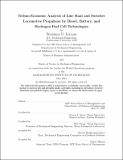Techno-Economic Analysis of Line Haul and Switcher Locomotive Propulsion by Diesel, Battery, and Hydrogen Fuel Cell Technologies
Author(s)
Lerman, Benjamin D.
DownloadThesis PDF (7.671Mb)
Advisor
Spear, Steven J.
Cheng, Wai
Terms of use
Metadata
Show full item recordAbstract
This thesis examines the critical challenges of reducing greenhouse gas (GHG) emissions within the freight rail industry of the United States transportation sector. The transportation sector, being a significant contributor to the nation’s GHG emissions, requires urgent attention to mitigate environmental and public health impacts. This thesis presents the emissions profile of the U.S. freight rail system and explores potential strategies for decarbonization. Previous research has established the freight rail system as a relatively more efficient mode of cargo transport in terms of emissions; however, to attain national goals set for GHG emissions, further reduction of its carbon footprint is required. Through a detailed analysis of the current propulsion technologies, ranging from conventional diesel-electric locomotives to emerging alternatives such as battery electric, hydrogen fuel cell, and electrified rail, the paper evaluates their potential to reduce emissions within the freight rail sector. The use of a Total Cost of Ownership (TCO) and Environmental Impact Analysis quantifies the financial and environmental implications of adopting these technologies. The findings reveal significant opportunities for reducing GHG emissions through the adoption of cleaner propulsion technologies. Challenges associated with their implementation include infrastructure requirements and technological readiness. A strategic roadmap for the decarbonization of freight rail is proposed, segmented into short-term (0-5 years), medium-term (5-15 years), and long-term (15+ years) objectives. Emphasis is placed on the importance of regulatory frameworks, technological advancements, and stakeholder collaboration in achieving a sustainable transition. The study aims to inform policymakers, industry stakeholders, and researchers about the pathways towards a sustainable and efficient freight rail system.
Date issued
2024-05Department
Massachusetts Institute of Technology. Department of Mechanical Engineering; Sloan School of ManagementPublisher
Massachusetts Institute of Technology